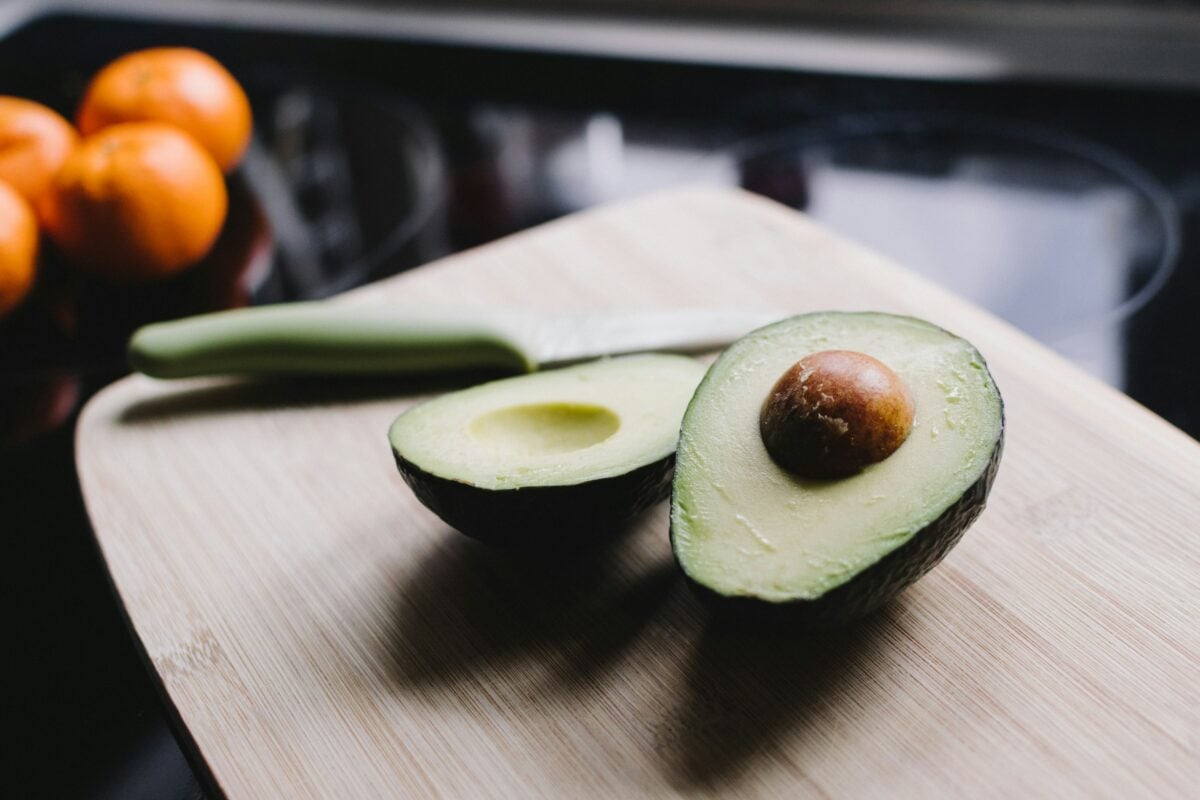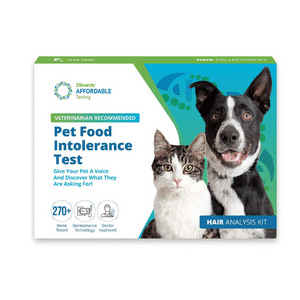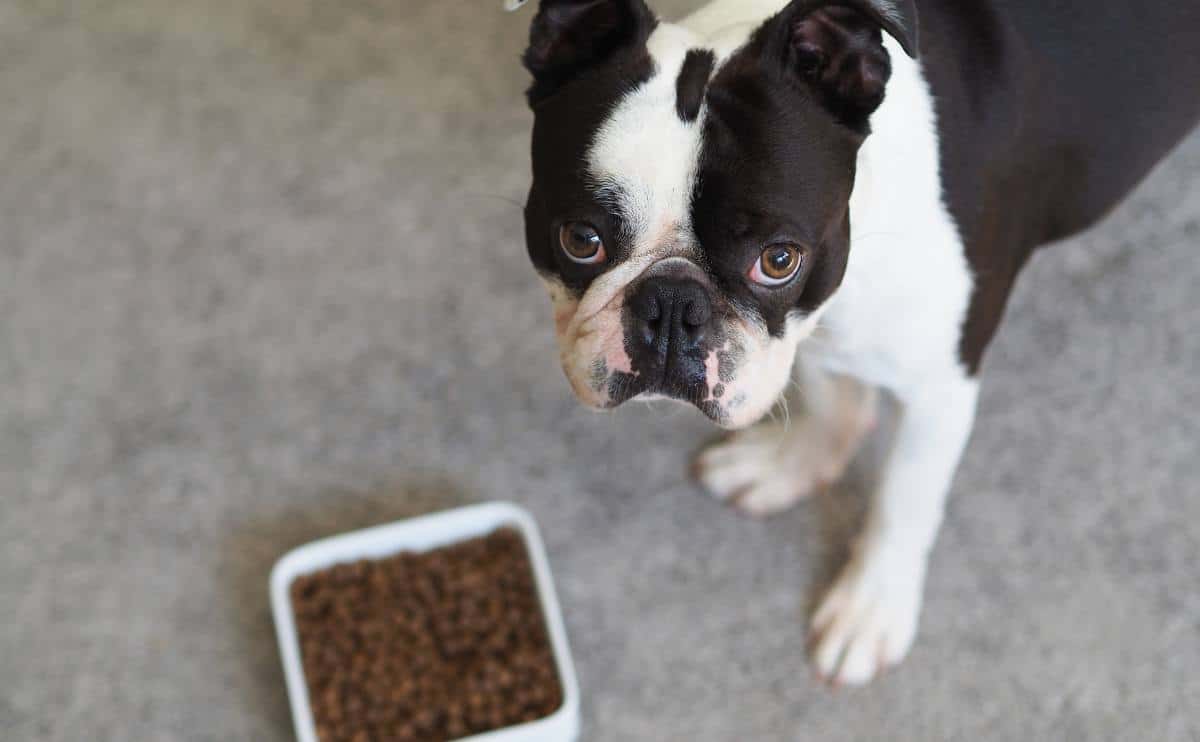Holy Guacamole! Can Dogs Actually Eat Avocados?
When you purchase through links on our site, we may earn a commission. Here’s how it works.
Your dog just swiped a chip loaded with guac, and now you’re wondering if you’ve accidentally fed them a toxic green time bomb.
Table of Contents
Avocados are packed with nutrients for humans, but are they safe for your pup’s belly? Here’s what you need to know before another bite goes down the hatch.
Is Avocado Toxic Or Totally Fine?
It depends on which part of your dog eats.

The bright green flesh? Usually fine in small amounts.
The pit and skin? Definitely not. They’re higher in persin, a natural compound that can cause stomach issues, and the pit is a major choking hazard.
Quick Takeaway
- Avocado flesh: Safe in small bites for most dogs
- Pit: Choking risk and harder to digest
- Skin: More persin, harder to digest
- Guacamole: Usually a no (thanks to onions and garlic)
Small dogs are more at risk, since even a little bit goes further in their tiny systems. When in doubt, skip the avo and grab a dog-safe snack instead.
Are There Any Benefits To Avocado For Dogs?
Yes, but only if you’re feeding the right part of the fruit, and in small amounts.

Avocado flesh contains healthy fats, fiber, and a range of other nutrients that are beneficial for dogs in moderation. Some commercial dog foods even use avocado meal or oil as a nutrient boost.
Potential perks of avocado flesh (in small doses):
- Omega-3 fatty acids – Can support skin and coat health
- Vitamin E – An antioxidant that may reduce inflammation
- Fiber – Supports healthy digestion
- Potassium and magnesium – Help with heart, nerve, and muscle function
- B vitamins (like B6, niacin, folate) – Aid metabolism and energy levels
But remember, these nutrients are also found in dog-safe foods with lower fat content. So while avocado isn’t useless, it’s not a must-have either.
Think of it as a “sometimes” snack—not a superfood for your dog.
Wait, What’s Persin?
Persin is a natural toxin found in avocados. It’s not a big deal for humans, but other animals process it differently.
The highest concentrations are in the skin, pit, and leaves. The flesh only contains trace amounts, but if your dog overeats, they may experience stomach trouble.
Think of persin like dog kryptonite. It won’t take your pup down instantly, but in high doses or for small dogs, it can lead to vomiting, diarrhea, or worse.
Where Persin Hides: Avocado Parts Ranked By Risk
Here’s where persin packs a punch.
| Avocado Part | Persin Level | Risk To Dogs |
|---|---|---|
| Flesh (pulp) | Low | Safe in small amounts |
| Skin | Moderate | Hard to digest |
| Pit | High | Toxic + choking/blockage |
| Leaves (tree) | Very High | Extremely toxic |
Persin levels aren’t the same in every avocado. Unripe fruit contains more persin than ripe ones, so if your dog ate part of a hard, underripe avocado, it could pose more risk.
If you have an avocado tree, watch out for leaves, bark, and fallen fruit. The leaves contain the highest levels of persin and are extremely toxic to dogs.
When Avocados Attack: Real Vet Stories
Most dogs won’t get sick from a small piece of avocado flesh. But the pit? That’s a whole other problem.
Dr. Rebecca MacMillan, a veterinarian, says she’s never treated a dog for persin poisoning, but she has seen avocado pits cause serious trouble.
I’ve never seen a dog for a consultation because they have eaten avocado flesh and developed symptoms. However, I always advise against giving it to dogs because it’s high in fat compared to healthier fruit and veg options.
In truth, the flesh is safe to eat in small amounts, but the pit and skin contain persin, which is toxic to dogs.
Again, I’ve not seen a dog with signs of persin toxicity in practice; however, I have seen a couple of dogs who had eaten avocado pits and ended up having to have them surgically removed from their intestine because they were causing a blockage.
– Dr. Rebecca MacMillan, BVetMed BSAVA PGCertSAM MRCVS
Even if the pulp is technically safe, it’s high in fat. That can lead to pancreatitis, especially in dogs with sensitive stomachs or a history of digestive issues.

In short: it’s not usually poison that lands dogs in the ER. It’s a pit, a poor reaction, or just too much of a good thing.
Can Dogs Eat Avocado Oil, Meal, or Guacamole?
Some avocado products are pup-safe in small doses. Others? Total vet-bill bait.

What’s Usually Safe
- Avocado oil: Found in some dog foods. Safe in small amounts.
- Avocado meal: Dehydrated pulp used in kibble. Also okay in moderation.
- Avocado flesh: Fine in tiny bites. Just skip the guac.
What To Avoid
- Avocado skin: Tough to digest and higher in persin.
- Avocado pit: Choking hazard and digestion nightmare.
- Guacamole: Loaded with garlic, onion, salt, and citrus—all bad for dogs.
If your pup licked a little guac off the floor, don’t panic. But if they devoured half a bowl, it’s time to call the vet.
Avocado Parts Ranked by Risk
| Avocado Part | Safe For Dogs? |
|---|---|
| Flesh (green pulp) | ✅ Yes, in small amounts |
| Oil | ✅ Yes, in moderation |
| Meal (in food) | ✅ Yes, safe in processed dog foods |
| Skin | ❌ Avoid — hard to digest + more persin |
| Pit | ❌ Dangerous — choking + intestinal risk |
| Guacamole | ❌ May contain toxins (onions, garlic, citrus) |
Avocados & Puppies: Tiny Tummies, Bigger Risks
Your wobbly little pup might look adorable nibbling some avocado, but don’t risk it.
Puppies have extra-sensitive stomachs and smaller bodies, so even a small bite of fatty fruit like avocado can lead to vomiting, diarrhea, or worse. Their systems also aren’t great at handling high-fat foods, which makes pancreatitis more likely.
If you’re introducing new foods, stick to safer options first. Avocado can wait. Check out our guide to human foods that are safe for dogs for alternatives.
Too Much Avocado? What Can Happen
Even if your dog only eats the safe part of an avocado, too much of it can still cause trouble. The high fat content and traces of persin can add up fast, especially for smaller pups.
Possible Side Effects
- Vomiting
- Diarrhea
- Lethargy
- Weight gain
- Pancreatitis (inflammation of the pancreas)
- Heart congestion (in rare cases)
- Choking or intestinal blockage if they swallowed the pit
If your dog has a sensitive stomach or health issues, even a small amount might trigger symptoms. Keep an eye out and don’t assume “one time” means it’s safe long term.
In rare cases, persin exposure has been linked to heart problems in animals like birds and large mammals. Dogs seem more resistant, but it’s still worth being cautious, especially if they eat a large amount or have preexisting health issues.
Breed & Health Risks
Some dogs are more sensitive to avocado than others. Breeds prone to pancreatitis, like Miniature Schnauzers and Cocker Spaniels, may react poorly even to small amounts of fatty food like avocado.
Dogs with obesity, digestive issues, or a history of GI trouble should avoid it altogether.
Can My Dog Be Allergic To Avocado?
Dogs can be allergic or sensitive to almost anything, and avocado is no exception.
Always try new foods one at a time so you can tell which foods cause a problem. If you notice diarrhea or vomiting, check with your vet.
If you want to be more certain about your dog’s allergies, try an at-home allergy kit for convenient testing in your home.
My Dog Ate Avocado. Now What?
First things first: don’t freak out.
If your dog just snuck a bite of avocado flesh, they’ll probably be fine. But if they ate the pit, skin, or a large amount of guacamole, here’s what to do.
What To Do Next
- Call your vet and explain what was eaten and how much
- Watch for symptoms like vomiting, diarrhea, or choking
- Don’t wait if your dog is small, has health issues, or seems off
Better to overreact than overlook. The sooner your vet knows what’s going on, the better they can help.
Poison Helpline & Vet Access
If you’re not sure how much your dog ate, or what part of the avocado they got into, call your vet or reach out to the Pet Poison Helpline (855-764-7661) or ASPCA Animal Poison Control Center (888-426-4435).
These calls typically cost under $75 and could save you an emergency vet visit. It’s also a good idea to keep your vet’s after-hours contact info handy and consider pet insurance for unexpected situations like this.
What Not To Do If Your Dog Eats Avocado
In a panic, it’s easy to overreact or follow bad advice from the internet. Here’s what not to do if your dog got into the avocado bowl.
In a panic, it’s easy to overreact or follow bad advice from the internet. Here’s what not to do if your dog got into the avocado bowl.
Don’t Do This
- Don’t try to make your dog throw up unless your vet tells you to. Some methods can make things worse or damage their throat.
- Don’t assume they’re fine just because they seem normal. Symptoms like pancreatitis or blockages can take hours to show up.
- Don’t give them bread, milk, or oil to “dilute” what they ate. These can make the situation worse.
- Don’t wait overnight if your dog ate the pit or skin. Intestinal blockages can be severe—and fast.
If you’re ever unsure, always call your vet or a pet poison helpline. It’s better to ask a dumb question than end up in the ER.
How Do I Prepare An Avocado?
This minute-and-a-half video from LoveOne Today shows you a few different ways to prepare an avocado.
Safe Snack Swaps For Avocado-Loving Pups
If your dog is obsessed with the creamy texture of avocado, don’t worry—there are safer ways to satisfy that craving without the vet bill.
Try These Instead
- Dog-safe peanut butter – Rich and satisfying, just use sparingly
- Cooked sweet potato – Soft, naturally sweet, and easy to digest
- Pumpkin puree – Smooth, low-fat, and great for digestion
- Banana slices – High in potassium and pup-approved
- Plain yogurt (unsweetened) – Creamy and probiotic-rich (if your dog tolerates dairy)
Frequently Asked Questions
Got more avocado-related questions? Here’s a quick bite of answers to the most common “Can my dog eat this?” worries we hear from fellow pup parents.
Don’t see your question? Ask us in the comments!
Can Avocado Kill A Dog?
It’s very unlikely. A small amount of avocado flesh probably won’t cause harm, but eating a large quantity, swallowing the pit, or consuming guacamole with toxic ingredients could lead to serious health problems.
Always call your vet if you’re unsure.
Is Avocado Oil Safe For Dogs?
Yes, in small amounts. Avocado oil is found in some commercial dog foods and is generally considered safe.
Just don’t drizzle it over their kibble without your vet’s guidance.
What If My Dog Ate Guacamole With Onion Or Garlic?
Call your vet. These ingredients can damage red blood cells and lead to more serious issues.
How Much Avocado Is Too Much For A Dog?
Most dogs can handle a bite or two of avocado flesh. But because it’s high in fat, anything more could upset your dog’s stomach or even trigger pancreatitis in sensitive pups. Small dogs are more at risk due to their size.
Can Puppies Eat Avocado?
It’s not recommended. Puppies have sensitive digestive systems and are more likely to react poorly to fatty foods.
Stick to gentle, pup-safe treats until they’re older.
More Safe Snacks For Dogs
Want more safe snack ideas? Explore our guides to dog-friendly fruits and veggies and our favorite healthy dog treats.




